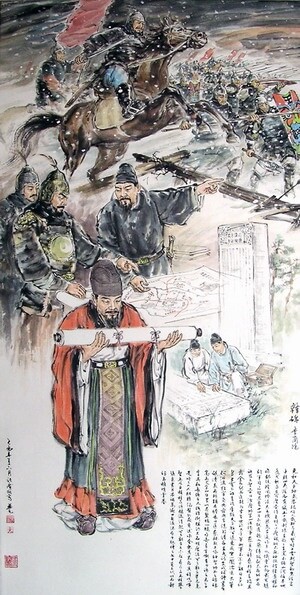The Han Monument
- Poetry of Li Shangyin

The Son of Heaven in Yuanhe times was martial as a god
And might be likened only to the Emperors Xuan and Xi.
He took an oath to reassert the glory of the empire,
And tribute was brought to his palace from all four quarters.
Western Huai for fifty years had been a bandit country,
Wolves becoming lynxes, lynxes becoming bears.
They assailed the mountains and rivers, rising from the plains,
With their long spears and sharp lances aimed at the Sun.
But the Emperor had a wise premier, by the name of Du,
Who, guarded by spirits against assassination,
Hong at his girdle the seal of state, and accepted chief command,
While these savage winds were harrying the flags of the Ruler of Heaven.
Generals Suo, Wu, Gu, and Tong became his paws and claws;
Civil and military experts brought their writingbrushes,
And his recording adviser was wise and resolute.
A hundred and forty thousand soldiers, fighting like lions and tigers,
Captured the bandit chieftains for the Imperial Temple.
So complete a victory was a supreme event;
And the Emperor said: "To you, Du, should go the highest honour,
And your secretary, Yu, should write a record of it."
When Yu had bowed his head, he leapt and danced, saying:
"Historical writings on stone and metal are my especial art;
And, since I know the finest brush-work of the old masters,
My duty in this instance is more than merely official,
And I should be at fault if I modestly declined."
The Emperor, on hearing this, nodded many times.
And Yu retired and fasted and, in a narrow workroom,
His great brush thick with ink as with drops of rain,
Chose characters like those in the Canons of Yao and Xun,
And a style as in the ancient poems Qingmiao and Shengmin.
And soon the description was ready, on a sheet of paper.
In the morning he laid it, with a bow, on the purple stairs.
He memorialized the throne: "I, unworthy,
Have dared to record this exploit, for a monument."
The tablet was thirty feet high, the characters large as dippers;
It was set on a sacred tortoise, its columns flanked with ragons....
The phrases were strange with deep words that few could understand;
And jealousy entered and malice and reached the Emperor --
So that a rope a hundred feet long pulled the tablet down
And coarse sand and small stones ground away its face.
But literature endures, like the universal spirit,
And its breath becomes a part of the vitals of all men.
The Tang plate, the Confucian tripod, are eternal things,
Not because of their forms, but because of their inscriptions....
Sagacious is our sovereign and wise his minister,
And high their successes and prosperous their reign;
But unless it be recorded by a writing such as this,
How may they hope to rival the three and five good rulers?
I wish I could write ten thousand copies to read ten thousand times,
Till spittle ran from my lips and calluses hardened my fingers,
And still could hand them down, through seventy-two generations,
As corner-stones for Rooms of Great Deeds on the Sacred Mountains.
Seven-character-ancient-verse
元和天子神武姿,彼何人哉轩与羲。
誓将上雪列圣耻,坐法宫中朝四夷。
淮西有贼五十载,封狼生貙貙生罴。
不据山河据平地,长戈利矛日可麾。
帝得圣相相曰度,贼斫不死神扶持。
腰悬相印作都统,阴风惨澹天王旗。
愬武古通作牙爪,仪曹外郎载笔随。
行军司马智且勇,十四万众犹虎貔。
入蔡缚贼献太庙,功无与让恩不訾。
帝曰汝度功第一,汝从事愈宜为辞。
愈拜稽首蹈且舞,金石刻画臣能为。
古者世称大手笔,此事不系于职司。
当仁自古有不让,言讫屡颔天子颐。
公退斋戒坐小阁,濡染大笔何淋漓。
点窜尧典舜典字,涂改清庙生民诗。
文成破体书在纸,清晨再拜铺丹墀。
表曰臣愈昧死上,咏神圣功书之碑。
碑高三丈字如斗,负以灵鳌蟠以螭。
句奇语重喻者少,谗之天子言其私。
长绳百尺拽碑倒,粗砂大石相磨治。
公之斯文若元气,先时已入人肝脾。
汤盘孔鼎有述作,今无其器存其辞。
呜呼圣王及圣相,相与烜赫流淳熙。
公之斯文不示后,曷与三五相攀追。
愿书万本诵万遍,口角流沫右手胝。
传之七十有二代,以为封禅玉检明堂基。
- Why Chinese poems is so special?
- The most distinctive features of Chinese poetry are: concision- many poems are only four lines, and few are much longer than eight; ambiguity- number, tense and parts of speech are often undetermined, creating particularly rich interpretative possibilities; and structure- most poems follow quite strict formal patterns which have beauty in themselves as well as highlighting meaningful contrasts.
- How to read a Chinese poem?
- Like an English poem, but more so. Everything is there for a reason, so try to find that reason. Think about all the possible connotations, and be aware of the different possibilities of number and tense. Look for contrasts: within lines, between the lines of each couplet and between successive couplets. Above all, don't worry about what the poet meant- find your meaning.
- An Early Audience at the Palace of Light, Harmonizing Secretary Jia Zhi's Poem
- Farewell to a Japanese Monk
- Watching the Hunt
- The Lake Qi
- The Pepper Garden
- Mengcheng Mound
- A Boat in Spring on Jo-Ya Lake
- Night at Longxing Temple
- The Abbot’s Hut
- Passing by Monk Rong’s Hermitage